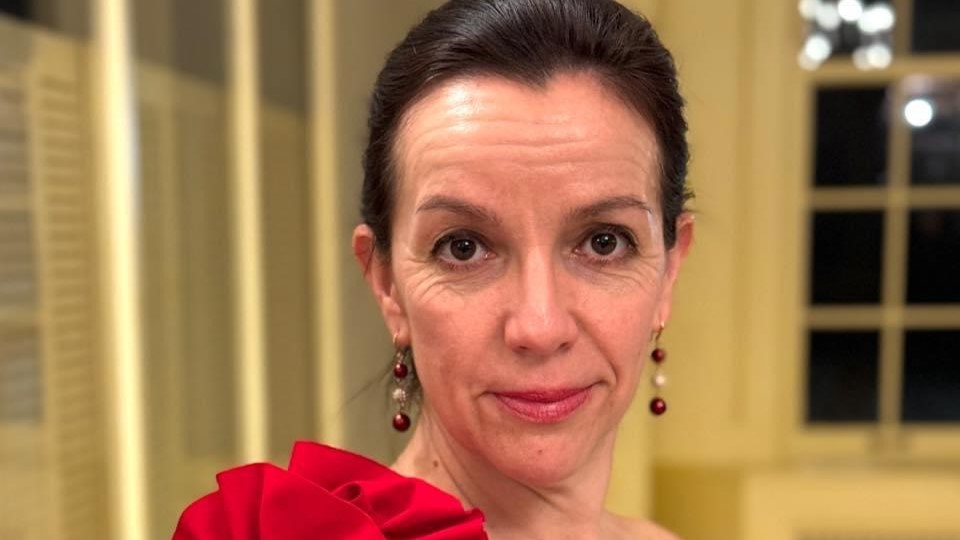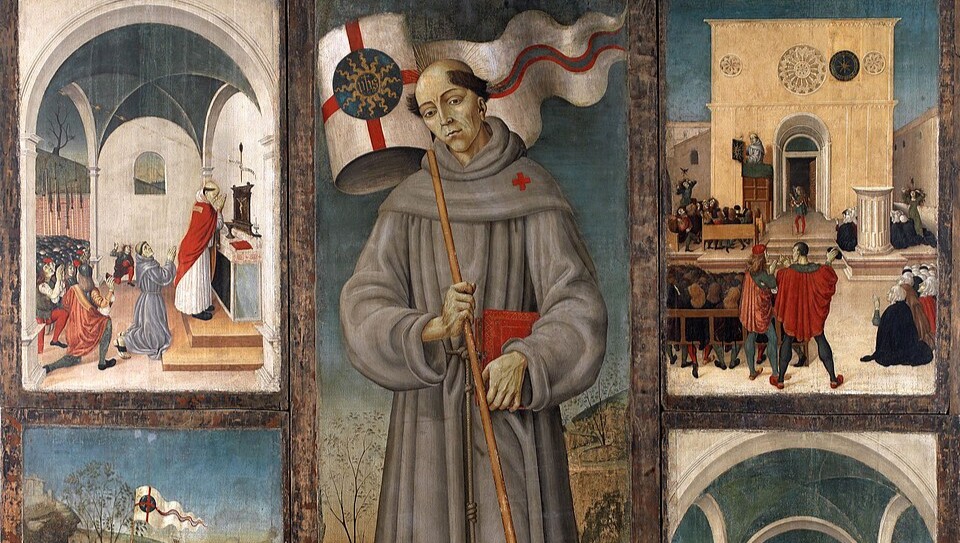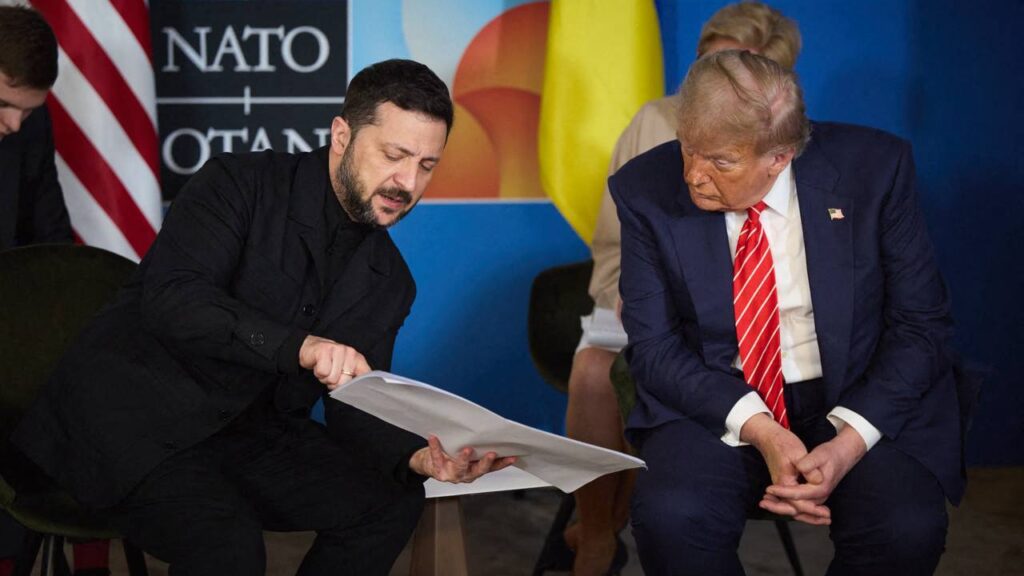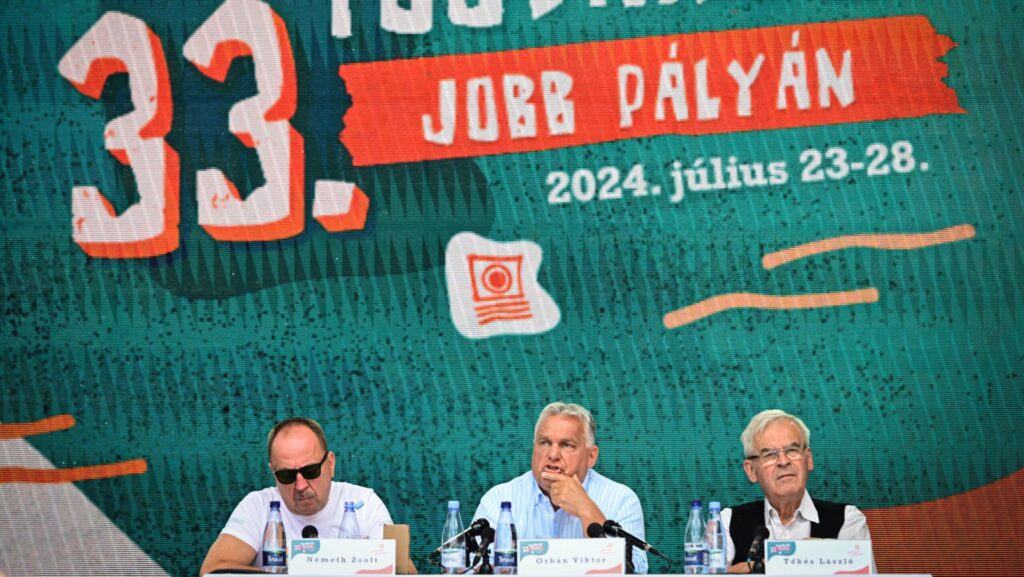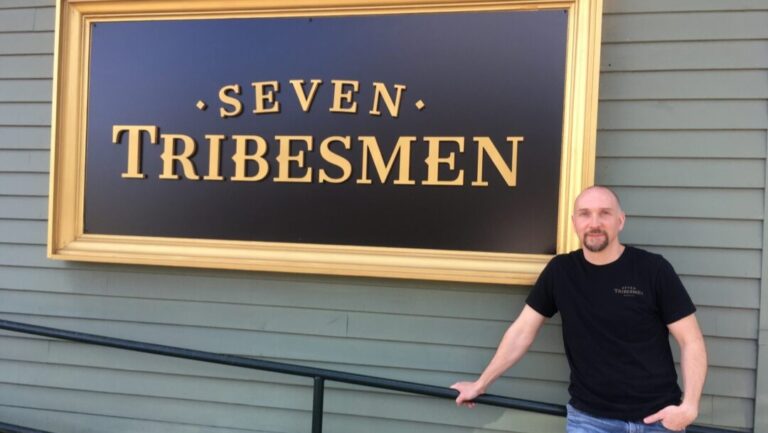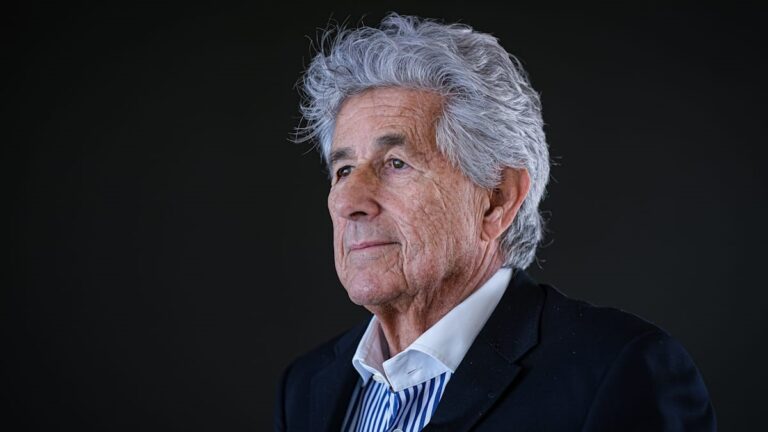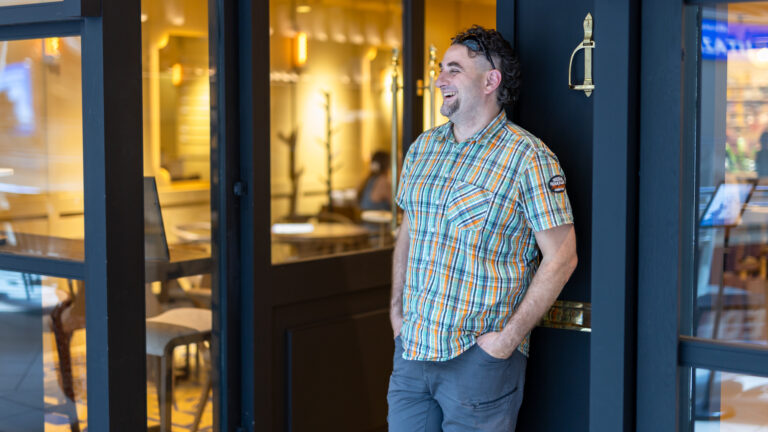Pianist Zsuzsánna Balla initially came to America for only a short time, following her love, like many others. However, few can say that it is the local Hungarian community that has kept them here: she sacrificed a promising musical career in Transylvania to become an active member of the Hungarian community in North America. Zsuzsánna is the organist and choir director at Holy Cross Church of Detroit, Michigan; she and her family are responsible for cultural programs for the Hungarian community in the Detroit area, helping wherever they can. They help not only on stage, but also in varying organizational and financial capacities; and not only in the local, but also in the wider Hungarian diaspora community.
***
How and when did you leave Transylvania?
My husband, then fiancé, won the green card lottery and went to work in Michigan. He was an economist, had just finished university and wanted to see the world. His mother financed his travel to the U.S., and he left for six months to try his luck. I had three jobs by then: I was a pianist in the Philharmonic Orchestra in Marosvásárhely (Târgu Mureș, Romania), where I also played the harpsichord, and taught and accompanied in competitions at the local music school, and in the weekends at the music faculty of the viola department of the university in Brassó (Brașov). I asked for a sabbatical at all three places to visit my fiancé, Ottó for three months. I arrived on 14 April 2001. The night before departure I played Vivaldi’s Four Seasons with the Brasov Philharmonic. The next morning, I boarded a bus for Kolozsvár (Cluj-Napoca, Romania) and headed overseas. Shortly afterwards, Ottó decided to extend his stay. We loved each other, so I also stayed. Since then, we have been living in Ypsilanti, Michigan and we are still here, but only because we can live among Hungarians. Ottó started his first job in the auto industry. He was hired by Toyota, where he could finally work in his profession for six months. He was then recruited by General Scientific Corp (GSC), where he has been working ever since, now as a financial manager. Because of his profession, we had several opportunities to move to another city or state but neither of us wanted to. We strongly believe it’s better to stay stable in one community, build friendships and help where and what we can instead of moving around for new opportunities. If I ever move out of here, I’ll just go back home to Transylvania…
Where does musical talent come from that your children also inherited?
My mother was a beautiful coloratura soprano, and my grandfather also had a beautiful voice.
In kindergarten, I was selected to attend music school with my brother. From then onwards it became obvious for us to become musicians. My brother, Sándor, is a year younger than me, but we were in the same class at school and university; everyone thought we were twins. We went to the university in Brasov because of their famous teachers, Stela Dragulin and Daniel Teodoru. I recommended my brother to be the organist and choir director of the Black Church, and his fantastic voice was discovered there. He transferred himself to Kolozsvár to study singing. He has become an internationally renowned opera singer, who was just as good on the clarinet. We give many concerts together, next time we’re performing together on September 29 at the Reformed Church in Los Angeles. My son Peter is 19, he’s studying at the University of Michigan majoring in violin. My daughter Évike is 17, now in high school, and she is the first flautist in both school ensembles.

Both of my children have played the piano for many years and perform with me frequently. At the age of seven, Péter was confronted at the annual Csipketábor (Lace Camp in English, the biggest Hungarian folk-dance gathering in the U.S.) with the fact that all the boys there, except him, played the violin for folk music… At his request we rented him an instrument, but later I asked him to learn to play classical violin, too. His classical music path started then, but he also progressed in folk music. Évike has also given up the piano, only playing it occasionally.
Did their love of folk music and dance come also from you?
We had nothing to do with folk dancing before we came to the U.S. During communism, my grandfather won a folk-dance competition in Kolozsvár, after which the gendarmes took him away and beat him up. Because of this trauma, my parents tried very hard to make us know nothing about folk dancing. In America, however, we met József Salamon, aka Sala, the founder of the Csipketábor. They asked us to prepare with them for the big gala show produced for the 10th anniversary of the camp. We learned and were part of Kalotaszeg, Mezőség, Szék, Szatmár, and Molva choreographies that were performed. Since then we couldn’t imagine our lives without folk dance. Our kids have grown into it. Péter once said: ‘Csipketábor is my life.’ During the Covid pandemic, he missed it so much that he drove out to the campsite—his bumper sticker is ‘Csipke’, too—just to see the place… At the camp, he is already teaching one of the children’s groups. Both of our children love to dance and are involved in all Hungarian events, both on and off stage. They once performed together in their school talent show, with Hungarian songs, music and folk dancing. We speak and write in Hungarian amongst each other, but Péter, for example, even wears his straw hat and the little Hungarian crown necklace he got from his grandfather in school.
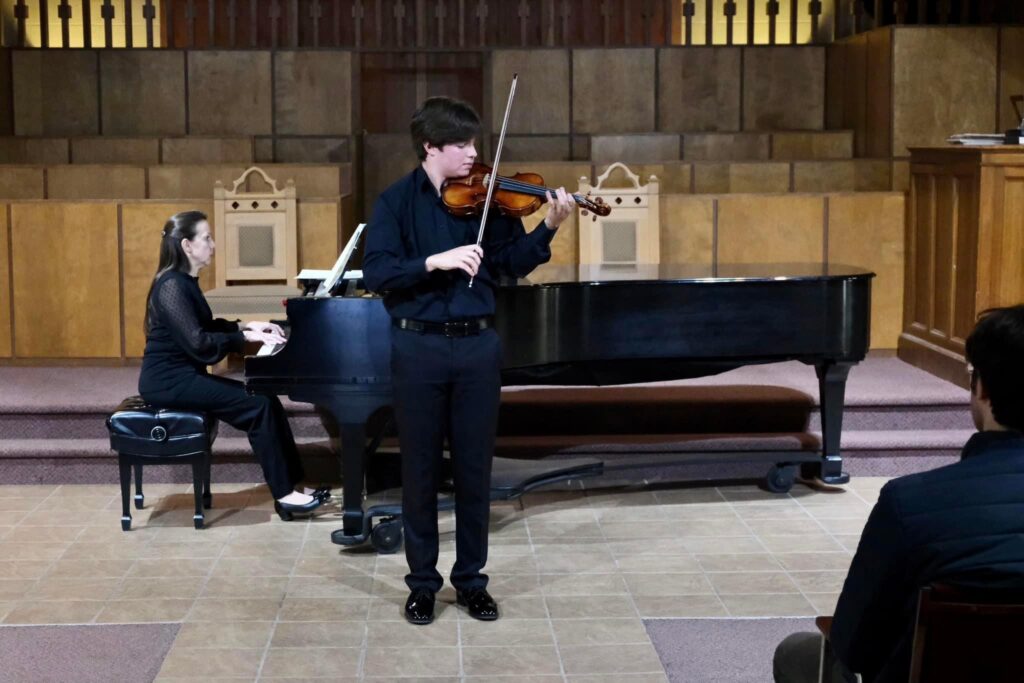
Right now, he is at the Rákóczi camp in Hungary, just like last year. Ottó is a good reciter of poetry, something that our children also inherited; he has participated in and won several Canadian diaspora recitation competitions.
What kind of work do you do as a piano teacher and performing artist?
As a member of the Ann Arbor Area Private Piano Teachers Association, I initially received my students through this association, but nowadays my ‘reputation’ is strong enough to receive students by simply word of mouth. Currently, I have thirty students. Of course, there are Hungarians among them whom I teach in Hungarian, because I think it is very important for them to have these musical experiences in Hungarian. Some ask for notes in Hungarian, others in English. I occasionally accompany students to high-level competitions, such as the Sphinx Competition.
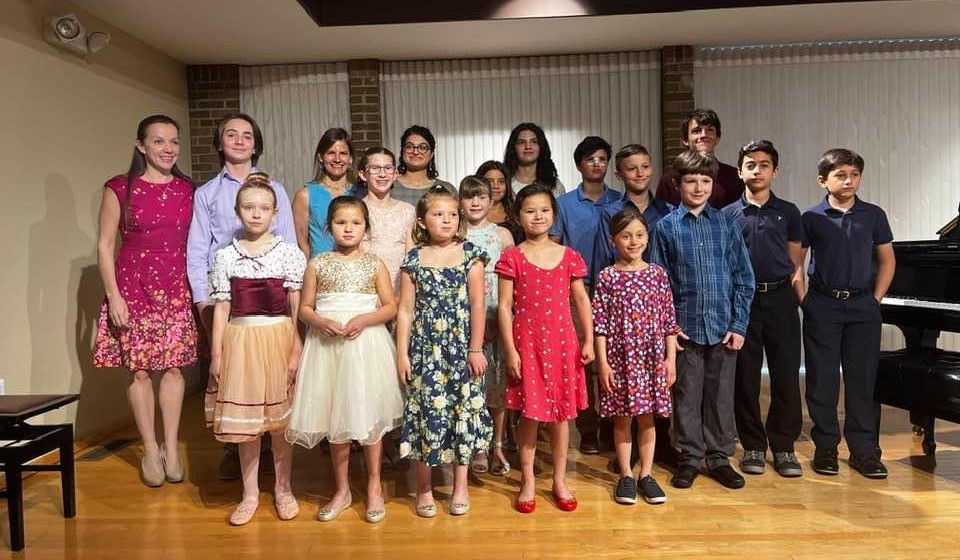
And I perform wherever I’m invited…I performed in Los Angeles, New York, Cleveland, Windsor, Toledo, Chicago and also here in Ann Arbor, Detroit, Allen Park. I never studied any Hungarian music in Romania. Everything else, including the obligatory Romanian pieces, but never anything Hungarian. No Bartók, no Kodály. When I came to the United States, everyone asked for Hungarian music, so I had to look them up and practice. That’s how my solo and duo performances started, with my brother or Tamás Szőr who was born and raised in Toledo, Ohio, and whose father was the conductor of the Toledo Symphony Orchestra for more than fifty years. When we met, I was performing Schumann’s Humoreske and he asked me to teach him. And so began our four-hander performances which expanded to include, for example, Brahms’ Hungarian Dances. We travelled all over the U.S. for ten years with our show. I’ve also performed with several actors from Hungary and Transylvania, including Károly Eperjes (one of the most iconic Hungarian conservative actors). After our performance he said: whenever I’m in Hungary, I should contact him, and he would be happy to perform with me again.
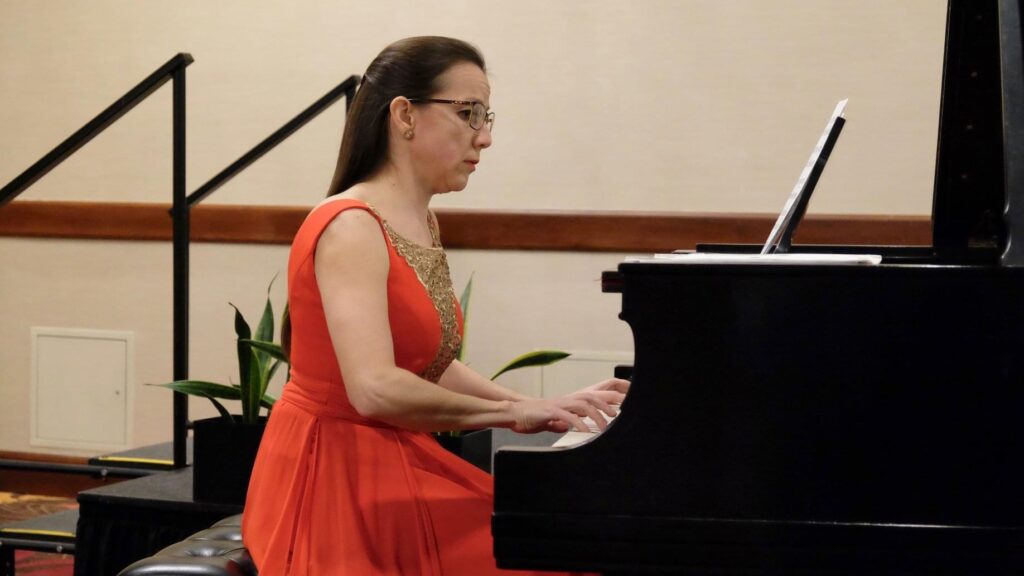
To return to the idea that love brought, but Hungarians kept you here… Who are these Hungarians around you, apart from the folk dancers mentioned?
Active Hungarian communities in Detroit can be found in the Catholic Church, the Reformed and Baptist congregations, and in the non-denominational Cultural Centre. The latter is a big deal, because most Hungarian communities in the U.S. don’t have their own Hungarian houses with green grass land. On the church line, we belong to the Catholic Church, and on the cultural line, as members of the Hungarian Traditions Circle, we used to belong to the Reformed Church, now to the Cultural Center. This is a small community of about 40–50 people, mostly Transylvanian, mostly older people. The much larger Catholic community is made up of mainly Hungarians immigrated from Hungary, at its core Hungarian 1956 refugees, so the dynamics of the two communities are somewhat different. We try to have a good relationship with both and be present everywhere needed, being in charge of the cultural program and music at their events. The Baptist congregation is somewhat isolated. In addition to the Csipketábor, there is another non-local community we frequent and actively help: the Hungarian Communions of Friends (MBK in Hungarian) and their ITT-OTT Conferences.
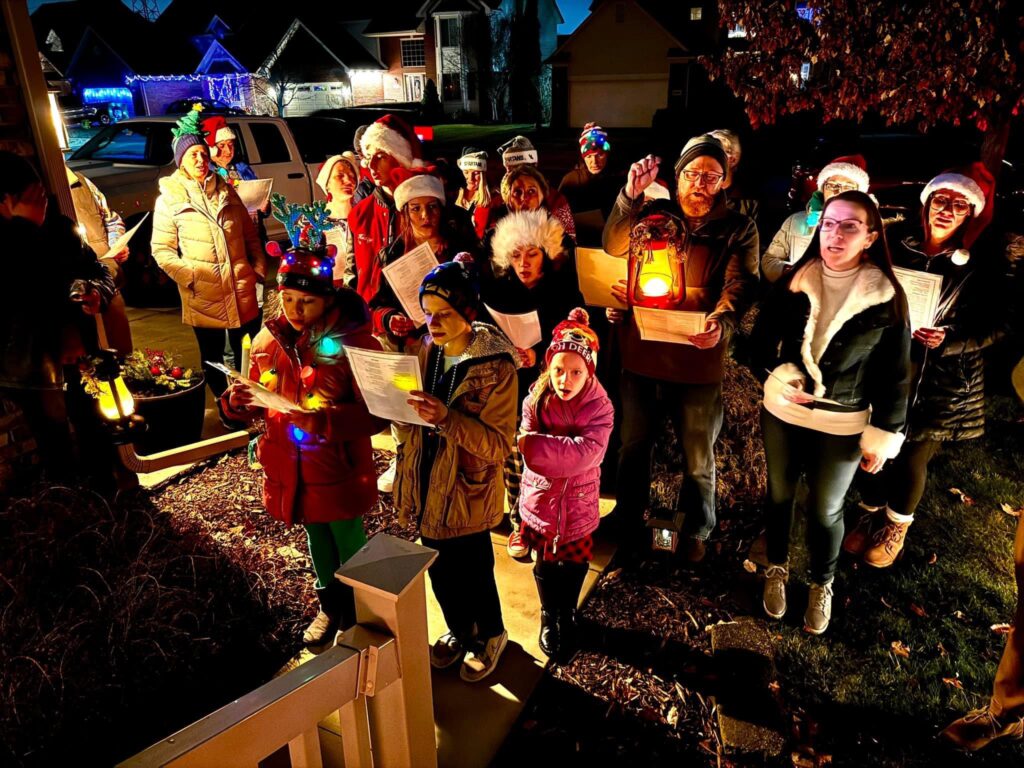
How did you become the organist and choir director of the Hungarian Catholic Church?
On the second weekend upon my arrival in the U.S., I went to the Hungarian Catholic Church in Detroit. After the mass, Father Angelus informed me that they were in need of an organist since the previous was leaving. He trained me and after six months of transition, I became, and I’ve been the organist ever since. I think that there is no other Hungarian church in the world with two priests like Father Angelus and Father Barnabás Kiss… I’ve visited many Hungarian churches in Transylvania, Hungary and the U.S., but nowhere have I heard such high-quality sermons and such wonderful voices when they sing together… It’s also exemplary how they hold the community together, especially Father Barnabás, and not only through the masses and all other the events around the church, but also at a personal level. He always commemorates everyone’s birthday and wedding anniversary. The community literally worships him. They also appreciate that masses here are also an artistic experience: classical music is often incorporated into them. My daughter plays the flute, my son the violin, and we have a regular singer, soprano Krisztina Körtvési.
I don’t think there is a mass of this quality and artistic value anywhere else in the Hungarian American diaspora!
In addition, Father Barnabás makes the altar decorations himself, he creates fantastic bouquets.
He also supports other Hungarian communities, right?
Yes, by sending out the Hungarian Catholic Newspaper weekly, distributed to the Hungarian Catholic community in the U.S. For many years, he was also responsible for the Hungarian Franciscan priests in the diaspora. Without him, we wouldn’t have a Hungarian church by now, and would have lost many other churches. He continuously fights to save them from closing, and to have more priests sent from Hungary. For example, the two priests saved the Hungarian church in Windsor, on the Canadian side of the Detroit River by going over every month to say a Hungarian mass there. Thanks to him, a Hungarian chapel was built in Washington, D.C. in the Basilica of the National Shrine of the Immaculate Conception. When these two fathers came to the U.S., they worked for the Hungarian publishing house that published the work of the famous Hungarian writer from Transylvania, Albert Wass. They’ve received Hungarian state awards for their community work: Father Barnabás is a recipient of the Gold Cross of Merit while Father Angelus is a recipient of the Silver Cross of Merit.
You’ve also received the latter…
Yes, in 2018, mainly due to Zita Bencsik, a Hungarian community diplomat resident in Chicago at the time, who helped us a lot. She came to so many of our events and not only dropped in, gave her speech and left, but spent time among us, and always tried to help everyone. Unfortunately, there were diplomats resident in Chicago for whom Detroit didn’t really exist… I still don’t understand, for example, why the consulate doesn’t have a proper database of Hungarian artists in the diaspora. Many talented artists from Hungary are brought to the US, the bigger projects are always staged in New York, but we, the ‘rural’ Hungarian artists are often left out… The current community diplomat in Chicago, László Aradvári is also active, committed and resourceful. He came to the ITT-OTT Conferences years ago as a KCSP-scholar and in five days, he put together a children’s folk dance performance that was something to be proud of… This year, he gave a lecture about the most famous Hungarian football player, Ferenc Puskás. He stayed for several days, joined us to the lakeshore as well as by the campfires… He seems to understand the essence of MBK, just like Zita did.
So did the current New York-based community diplomat, Nikolett Szántovszky. It seems it’s worth inviting them to community events. Back to the Catholic community…
There used to be a lot more of us, but now we are less. Even today, the church is still full at the main celebrations but unfortunately the young people don’t come regularly… If it’s raining, if they have other plans, they skip the mass. They don’t understand that if someone only looks at their feelings of the moment and to this Sunday and doesn’t think ahead, if they don’t come and bring their children to church for any reason, they are weakening the whole community, because if everyone act like this, sooner or later there will be no Hungarian church. And if they aren’t present, if they don’t volunteer, sooner or later there will be no Hungarian organizations and communities either… It’s not sustainable to have only a few active people. I prepare the children’s Christmas performance in the church, and with Kulcsár Olga the Mother’s Day show at the Cultural Centre. As we didn’t have a scout’s troop and Hungarian school on the weekends, we started one, but it ceased due to lack of teachers. The bigger community events like the Pig Roast in mid-September, where hundreds of people come, are different: many more people help in the background, prepare the food and serve it.
This event takes place the day before the church farewell celebrations, right? What else is there to know about the Cultural Centre?
The celebration of the founding of the Church of the Holy Cross is fixed. This is the biggest celebration of our church as it was consecrated on 20 September 1925, therefore we’ll have this year’s celebrations on 15 September. The Cultural Centre’s foundation stone was laid by the ‘56ers and it belongs to everyone who pays the membership fees. It’s the venue for national celebrations, the harvest ball, the Mother’s Day concert, the pig roast, the gulyás competition and they also host diplomats from the consulate there. We also hold our national celebrations at the Catholic Church, since that’s where they were originally held and because the church is a much better place to experience them. There used to be literary evenings organized in the Cultural Centre, founded by János Stubits, for a very long time, but since he died, nobody has continued it unfortunately. My husband was the financial director of the Cultural Centre for a while, as still is for the Csipketábor and MBK.
What about the Reformed Church?
Unfortunately the services are now attended by only 10–20 people. István Kacsó was their pastor when we arrived, from the vicinity of Marosvásárhely. Then reverend Ferenc Varga came, who ultimately left unexpectedly. Since then, services are held by the retired Baptist priest Géza Herjeczki who saved the church until a new pastor will be arriving from Hungary in mid-September!
Besides church, students, performances and community, you are also have a family. Who helped when kids were younger and how are you coping nowadays?
I was very lucky to have my dad with us for 13 years. He took care of our young children, while I was performing or working. There is of course my husband, without whom I couldn’t even teach in the afternoons. I’ve always had a very strong, supportive family background, and still have now, when it’s much easier in that respect. Still, many people ask me: don’t you want to slow down? The truth is that for me, for example, playing in the church isn’t work. But it wasn’t always like that… I always liked to spend time in churches, but going to mass or confessing regularly wasn’t important for me for a long time, so when I was asked to be the organist, I wasn’t even very familiar with the order of the mass. The organ was not fully unknown to me, since I occasionally played the organ of the Black Church in Brasov. It follows that when I was asked to play here, I wasn’t worried about how to play, but when to play it. In the beginning I taught myself and wrote everything and I’m still cheating: I use the pipes and hand buttons to blend out the low notes. It’s the deepest joy and greatest honor for me to play in this church every Sunday, where I’m always deeply filled with spirituality. I can’t imagine my life without this church! It’s also very important that we travel to Transylvania every year, we speak only Hungarian with our kids; we hope they will continue to carry this torch.
All photos in this articles are courtesy of Zsuzsánna Balla.

